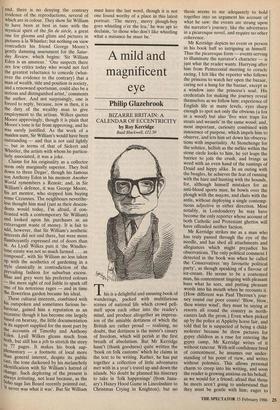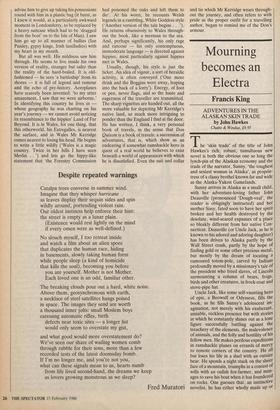A mild and magnificent eye
Philip Glazebrook
BIZARRE BRITAIN: A CALENDAR OF ECCENTRICITY by Roy Kerridge
Basil Blackwell, £12.50
This is a delightful and amusing book of wanderings, packed with multifarious scenes of national life which crowd pell- mell upon each other into the reader's mind, and produce altogether an impress- ion of the amiable dottiness of which the British are rather proud — realising, no doubt, that dottiness is the miner's canary of freedom, which will perish at the first breath of absolutism. But Mr Kerridge hasn't (thank goodness) quite written the 'book on folk customs' which he claims in the text to be writing. Rather, he has put together a collection of little adventures met with in a year's travel up and down the islands. No doubt he planned his itinerary to take in 'folk happenings' (from Janu- ary's Haxey Hood Game in Lincolnshire to Christmas Crying in Knighton); but no thesis seems to me adequately to hold together into an argument his account of what he saw: the events are strung upon the narrator's journey, like the adventures in a picaresque novel, and require no other coherence.
Mr Kerridge depicts no event or person in his book half so intriguing as himself. Thus the picaresque form — events serving to illuminate the narrator's character — is just what the reader wants. Hurrying after him from Pentecostal meeting to coracle racing, I felt like the reporter who follows the princess to watch her open the bazaar, caring not a hang for the bazaar, except as a window into the princess's soul. His credentials for making the journey reveal themselves as we follow him: experience of English life at many levels, eyes sharp enough to spot not only the obvious (a fox in a wood) but also 'five wire traps for stoats and weasels' in the same wood; and, most important, curiosity combined with innocence of purpose, which impels him to observe, and lets him set down his observa- tions with impartiality. At Stonehenge for the solstice, hellish as the mêlée within the stone circle looks to him, he yet leaps the barrier to join the crush, and brings us word with an even hand of the rantings of Druid and hippy alike. In an outing with the beagles, he achieves the feat of running with the hare and hunting with the hounds, for, although himself mistaken for an anti-blood sports man, he bowls over the plough with the majors, and chats with the antis, without deploying a single contemp- tuous adjective in either direction. Most notably, in Londonderry he may have become the only reporter whose account of both Catholic and Protestant ghettos will have offended neither faction.
Mr Kerridge strikes me as a man who has truly passed through the eye of the needle, and has shed all attachments and allegiances which might prejudice his observations. The only political comment I detected in the book was when he called the Conservatives 'my favourite political party', as though speaking of a flavour of ice-cream. He seems to be a contented man, his contentment tingeing with pleasant hues what he sees, and putting pleasant words into his mouth when he recounts it. (How different was Paul Theroux's jour- ney round our poor coasts! 'Blow, blow, thou winter wind', they must be saying at resorts all round the country as north- easters lash the prom.) Even when picked up by the police at Appleby horse fair, and told that he is suspected of being a child- molester because he drew pictures for gypsy children as a ruse for entering the gypsy camp, Mr Kerridge writes of it without rancour. With self-confidence bred of contentment, he assumes our under- standing of his point of view, and writes without polemics. This allows personal charm to creep into his writing, and soon the reader is growing anxious on his behalf, as we would for a friend; afraid that those he meets aren't going to understand that they must be gentle with him; eager to advise him to give up taking his possessions round with him in a plastic bag (it burst, as I knew it would, at a particularly awkward moment in Londonderry, to be replaced by a heavy suitcase which had to be 'dragged from the boat' on to the Isle of Man). I saw him go up to all manner of bullies (Ian Paisley, gypsy kings, Irish landladies) with my heart in my mouth.
But all was well. His mildness saw him through. He seems to live inside his own version of reality, stranger but safer than the reality of the hard-boiled. It is old- fashioned — he sees 'a battleship' from its shores — it is full of legend and rumour and the echo of pre-history. Aeroplanes have scarcely been invented: 'to my utter amazement, I saw that we were airborne.' In identifying this country he lives in — whose geography he was charting on his year's journey — we cannot avoid noticing its resemblance to the hippies' Land of Far Beyond. It is in Wales, for one thing, that this otherworld, his Estregalles, is nearest the surface, and in Wales Mr Kerridge comes nearest to losing his head. He begins to write a little wildly Males is a magic country. Twice in her hills I have seen Merlin . . ') and lets go the hippy-like statement that 'the Forestry Commission had poisoned the oaks and left them to die'. At his worst, he recounts Welsh legends in a rambling, White Goddess style (`Another version of the tale begins . . .'). He returns obsessively to Wales through- out the book, like a merman to the sea. And, perhaps significantly, his only rage and rancour — his only contemptuous, immoderate language — is directed against hippies, most particularly against hippies met in Wales.
Usually, though, his style is just the ticket. An idea of vigour, a sort of heraldic activity, is often conveyed ('One more drink and the Boggins were away, leaping into the back of a lorry'). Energy, of foot or pen, never flags, and so the haste and eagerness of the traveller are transmitted. The sharp vignettes are handed out, all the more valuable for depicting Mr Kerridge's native land, so much more intriguing to ponder than the England I find at the door. He has written, I think, a very personal book of travels, in the sense that Don Quixote is a book of travels: a succession of adventures, that is, which show us an endearing if somewhat ramshackle hero in quest of a real world he believes to exist beneath a world of appearances with which he is dissatisfied. Even the suit and collar and tie which Mr Kerridge wears through- out the journey, and often refers to with pride as the proper outfit for a travelling author, began to remind me of the Don's armour.






































 Previous page
Previous page